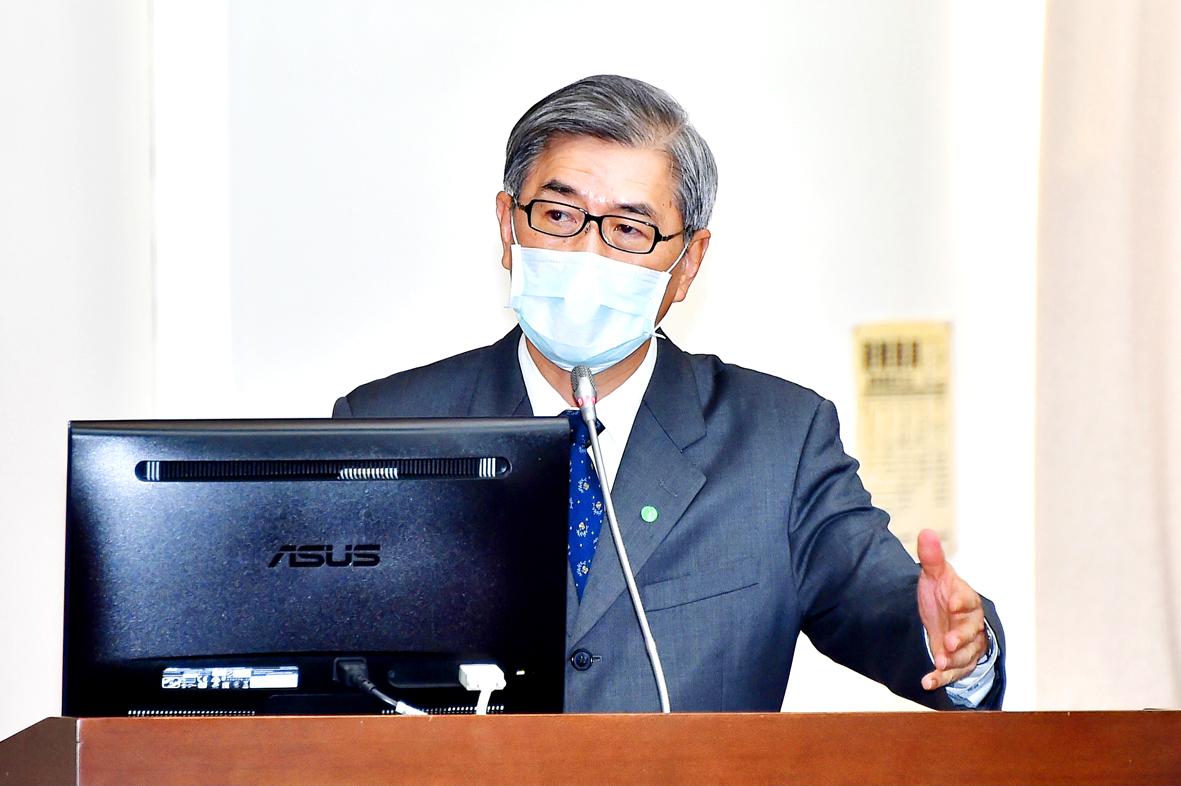The Financial Supervisory Commission (FSC) is to investigate a buy-now-pay-later service offered on e-commerce platform Shopee to determine if it is likely to trigger a credit crisis for young consumers, the commission said yesterday.
The commission would examine the service mechanism that allows consumers without credit cards to delay payments by up to 45 days to see if the service exercises solid risk control, FSC Chairman Thomas Huang (黃天牧) told reporters on the sidelines of a meeting of the legislature’s Finance Committee in Taipei.
The service, launched last month, enables consumers to pay later, or by the 15th day of the following month, without having to pay interest, Shopee’s Web site says.

Photo: Tu Chien-jung, Taipei Times
The amount of payment that can be delayed is capped at NT$30,000, with wire transfer being the only financial tool for payment, it says.
The service also offers installment payment plans, but charges annual interest of up to 20 percent, the Web site says.
“The service is more accessible and convenient than credit cards,” Shopee said on its Web site.
The service is similar to banks’ credit card or lending service, as it enables consumers to shop first and pay later, Democratic Progressive Party (DPP) Legislator Michelle Lin (林楚茵) told the meeting.
“I am worried that this service would encourage young consumers to buy things they cannot afford. What is more concerning is that if the service has no solid credit risk management, it might cause another bad debt crisis,” Lin said.
The spending limit of NT$30,000 per person sounds not too much, but younger consumers are likely to use the service, she added.
The commission would check whether it is the third-party payment service provider ShopeePay Taiwan Co (蝦皮支付) or the e-commerce platform operator Shopee Taiwan Co (樂購蝦皮) that offers the service, Banking Bureau Director-General Sherri Chuang (莊琇媛) said.
Both ShopeePay and Shopee Taiwan fall under the Ministry of Economic Affairs’ supervision due to their businesses of third-party payment services and e-commerce respectively.
However, Chuang said that the commission could have some degree of control over ShopeePay, as the firm is planning to apply for a license to run an electronic payment service in Taiwan.
The FSC should ask ShopeePay to halt the buy-now-pay-later service when the firm applies for the license, as e-payment companies are not allowed to provide loans, she said.
That is because e-payment companies already allow consumers to park money on their platforms, and if they were to grant loans, they would be too similar to banks, which are subject to tighter regulations, Chuang said.

MULTIFACETED: A task force has analyzed possible scenarios and created responses to assist domestic industries in dealing with US tariffs, the economics minister said The Executive Yuan is tomorrow to announce countermeasures to US President Donald Trump’s planned reciprocal tariffs, although the details of the plan would not be made public until Monday next week, Minister of Economic Affairs J.W. Kuo (郭智輝) said yesterday. The Cabinet established an economic and trade task force in November last year to deal with US trade and tariff related issues, Kuo told reporters outside the legislature in Taipei. The task force has been analyzing and evaluating all kinds of scenarios to identify suitable responses and determine how best to assist domestic industries in managing the effects of Trump’s tariffs, he

TIGHT-LIPPED: UMC said it had no merger plans at the moment, after Nikkei Asia reported that the firm and GlobalFoundries were considering restarting merger talks United Microelectronics Corp (UMC, 聯電), the world’s No. 4 contract chipmaker, yesterday launched a new US$5 billion 12-inch chip factory in Singapore as part of its latest effort to diversify its manufacturing footprint amid growing geopolitical risks. The new factory, adjacent to UMC’s existing Singapore fab in the Pasir Res Wafer Fab Park, is scheduled to enter volume production next year, utilizing mature 22-nanometer and 28-nanometer process technologies, UMC said in a statement. The company plans to invest US$5 billion during the first phase of the new fab, which would have an installed capacity of 30,000 12-inch wafers per month, it said. The

Taiwan’s official purchasing managers’ index (PMI) last month rose 0.2 percentage points to 54.2, in a second consecutive month of expansion, thanks to front-loading demand intended to avoid potential US tariff hikes, the Chung-Hua Institution for Economic Research (CIER, 中華經濟研究院) said yesterday. While short-term demand appeared robust, uncertainties rose due to US President Donald Trump’s unpredictable trade policy, CIER president Lien Hsien-ming (連賢明) told a news conference in Taipei. Taiwan’s economy this year would be characterized by high-level fluctuations and the volatility would be wilder than most expect, Lien said Demand for electronics, particularly semiconductors, continues to benefit from US technology giants’ effort

‘SWASTICAR’: Tesla CEO Elon Musk’s close association with Donald Trump has prompted opponents to brand him a ‘Nazi’ and resulted in a dramatic drop in sales Demonstrators descended on Tesla Inc dealerships across the US, and in Europe and Canada on Saturday to protest company chief Elon Musk, who has amassed extraordinary power as a top adviser to US President Donald Trump. Waving signs with messages such as “Musk is stealing our money” and “Reclaim our country,” the protests largely took place peacefully following fiery episodes of vandalism on Tesla vehicles, dealerships and other facilities in recent weeks that US officials have denounced as terrorism. Hundreds rallied on Saturday outside the Tesla dealership in Manhattan. Some blasted Musk, the world’s richest man, while others demanded the shuttering of his